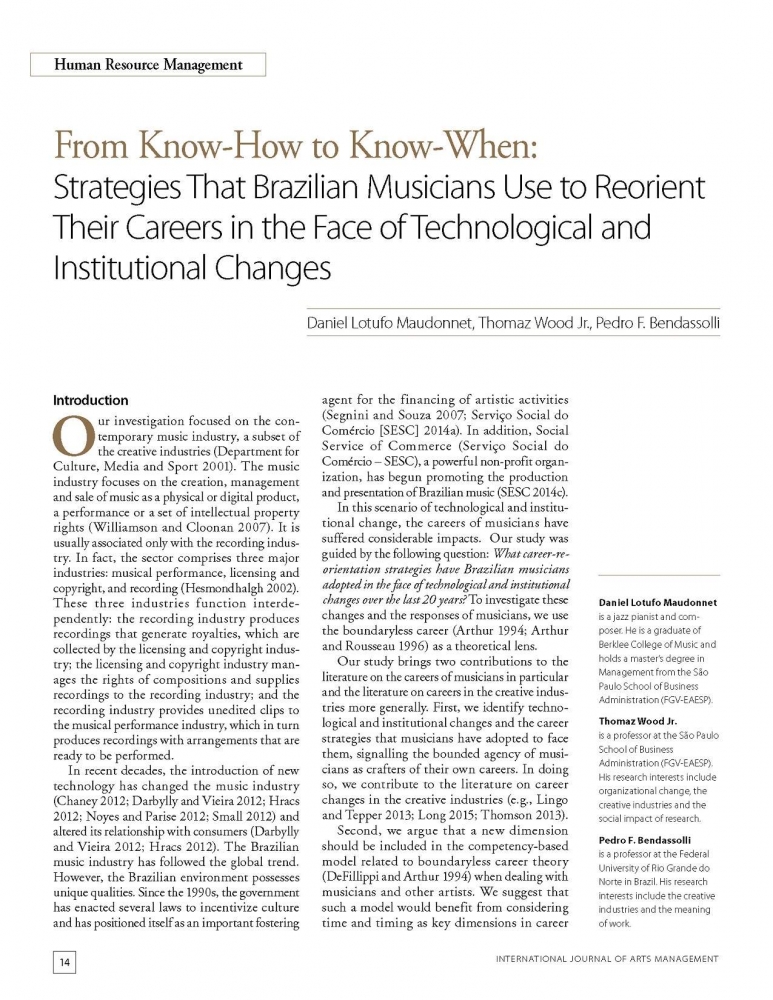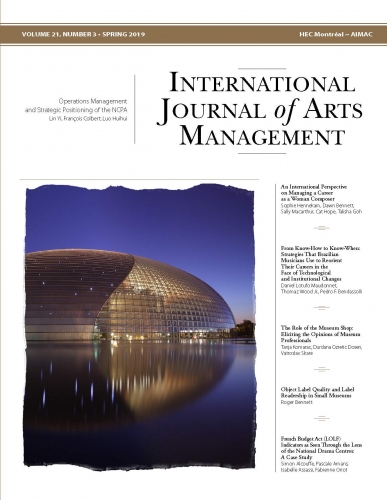From Know-How to Know-When: Strategies That Brazilian Musicians Use to Reorient Their Careers in the Face of Technological and Institutional Changes
Product: Article
$21.00 CA
Daniel Lotufo Maudonnet, Thomaz Wood Jr., Pedro F. Bendassolli
Daniel Lotufo Maudonnet is a jazz pianist and composer. He is a graduate of Berklee College of Music and holds a master’s degree in Management from the São Paulo School of Business Administration (FGV-EAESP).
Thomaz Wood Jr. is a professor at the São Paulo School of Business Administration (FGV-EAESP). His research interests include organizational change, the creative industries and the social impact of research.
Pedro F. Bendassolli is a professor at the Federal University of Rio Grande do Norte in Brazil. His research interests include the creative industries and the meaning of work.
ABSTRACT
The purpose of this exploratory study was to identify the career-reorientation strategies of Brazilian musicians in the face of technological and institutional changes. These changes include the introduction of new production and distribution technologies, the enactment of laws incentivizing culture, and the promotion of music by a powerful non-profit organization. In-depth interviews were conducted with highly experienced musicians. Two career-orientation strategies were identified: the search for complementary activities, and artistic entrepreneurship. The findings contribute to research on careers in the creative industries, revealing how musicians have perceived and responded to change. The findings also reveal how old boundaries have given way to new ones that limit and constrain musicians’ agency. Based on these findings, the authors suggest a new competency, know-when, to be added to the three described in the theory of a boundaryless career: knowwhy, know-how and know-whom. The findings also demonstrate how the actions of governments and organizations intended to support musicians may have contradictory effects.
KEYWORDS
Creative industries, music industry, careers, boundaryless careers, technological changes, institutional changes
RÉSUMÉ
L’objectif de cette étude exploratoire était d’identifier des stratégies de réorientation de carrière employées par des musiciens brésiliens dans un contexte de changements technologiques et institutionnels. Ces changements incluent l’introduction de nouvelles technologies de production et de distribution, l’adoption de lois encourageant la culture et la promotion de la musique par un puissant organisme sans but lucratif. Des entrevues en profondeur ont été menées auprès de musiciens très expérimentés. Deux stratégies d’orientation de carrière ont été identifiées : la recherche d’activités complémentaires et l’entrepreneuriat artistique. En témoignant de la façon dont les musiciens ont perçu les changements et se sont adaptés à ceux-ci, les résultats de cette étude contribuent à la recherche sur des carrières au sein des industries créatives. De plus, ils démontrent que d’anciennes barrières ont été remplacées par des nouvelles qui posent des limites et des contraintes au pouvoir d’agir des musiciens. En s’appuyant sur ces résultats, les auteurs suggèrent qu’une nouvelle compétence – le savoir quand – soit ajoutée aux trois autres décrites dans la théorie des carrières sans frontières : savoir pourquoi, savoir-faire et savoir qui. Les résultats démontrent également comment les actions mises en place par les gouvernements et les organismes dans le but d’aider les musiciens peuvent avoir des effets contradictoires.
MOTS CLÉS
Industries créatives, industrie de la musique, carrières, carrières nomades, changements technologiques, changements institutionnels
RESUMEN
Con este estudio exploratorio se propone identificar las estrategias de reorientación de carrera de los músicos brasileños ante los cambios tecnológicos e institucionales. Estos cambios incluyen la introducción de nuevas tecnologías de producción y distribución, la promulgación de leyes de fomento de la cultura y la promoción de la música por una poderosa organización sin fines de lucro. Se llevaron a cabo entrevistas con profundidad con músicos de gran experiencia. Se identificaron dos estrategias de orientación de carrera: la búsqueda de actividades complementarias, y el empresariado artístico. Los resultados representan un aporte a la investigación sobre las carreras en las industrias creativas al exponer cómo los músicos han percibido los cambios y reaccionado a ellos. Los resultados también muestran como las antiguas fronteras han cedido a nuevas, que limitan y contraen las acciones de los músicos. Sobre la base de estos resultados, los autores proponen una nueva aptitud, el saber-cuándo, a añadir a las tres descritas en la teoría de la carrera sin fronteras: el saber-por qué, el saber-cómo, y el saber-quién. Los resultados también muestran cómo las acciones de gobiernos y organizaciones, destinadas a apoyar a los músicos, pueden tener efectos contradictorios.
PALABRAS CLAVE
Industrias creativas, industria musical, carreras, carrera sin fronteras, cambios tecnológicos, cambios institucionales

